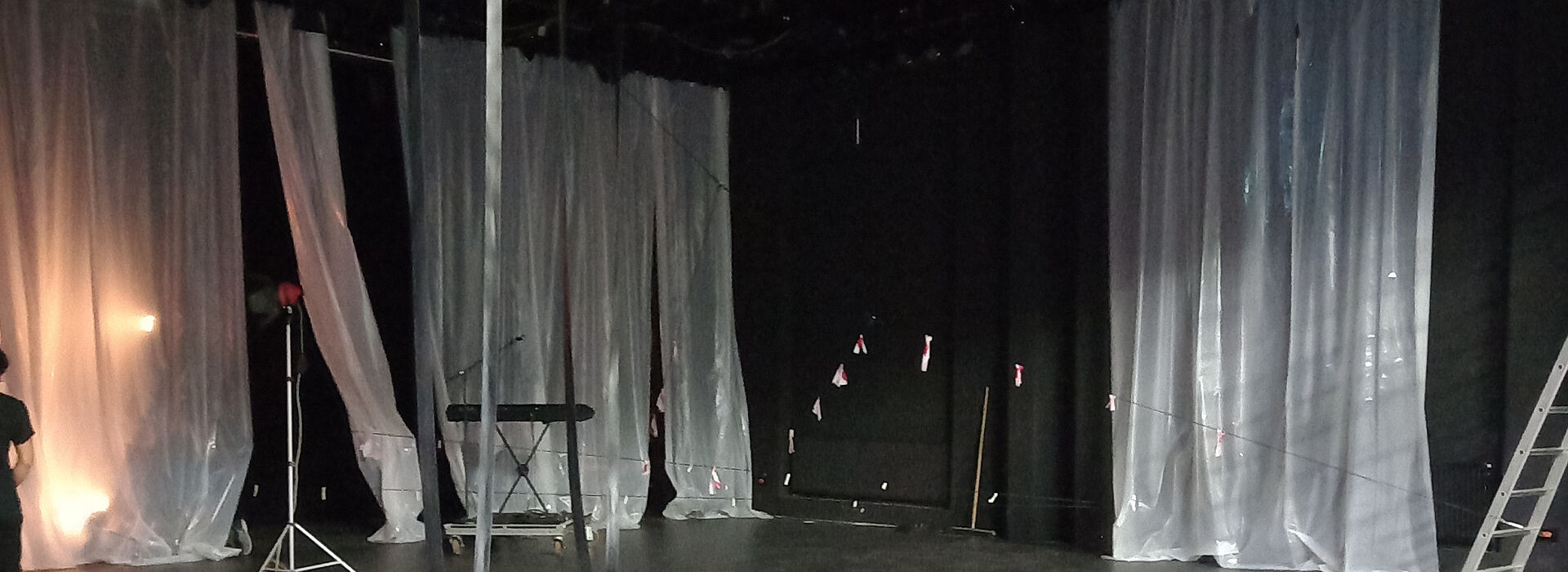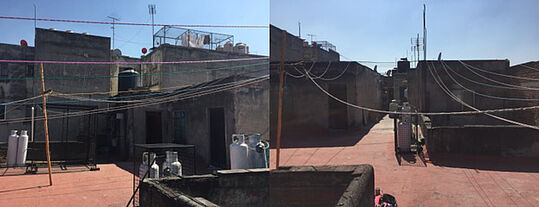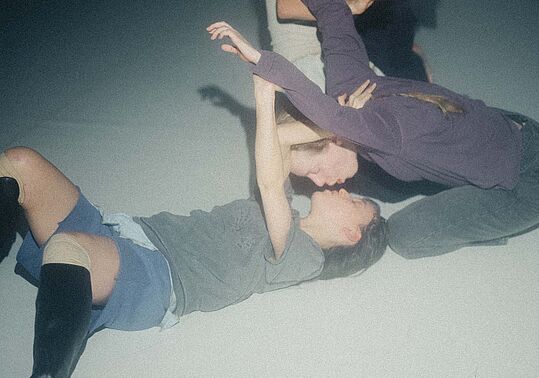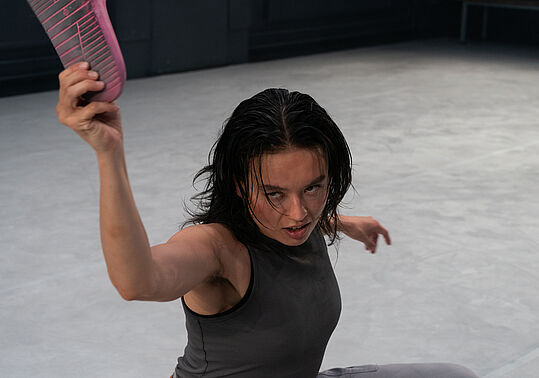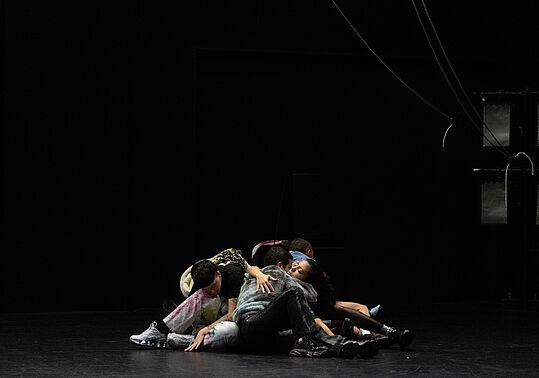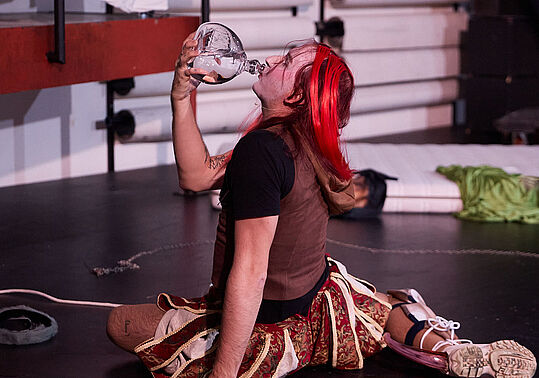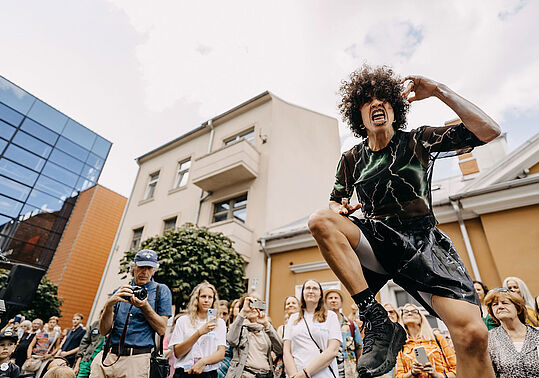We have never been so alone in front of the other
The starting point of "Speech of Love: Abscence" is "Fragments d'un discours amoureux" ("Fragments of a Language of Love", 1977) by Roland Barthes, a French philosopher. Why did you choose this work? What interests you about it?
Elisabeth B. Tambwe: « Fragments D'un Discours Amoureux » has fascinated me for many years now. What fascinates me is that the reader thinks s_he is reading a book about love and Roland Barthes only talks to us about solitude.
The existence of the lover is marked by the absence of the beloved, Barthes says. What does it mean for you to think performatively about love and to develop a performance with this work and Barthes' approach to the subject of love?
Elisabeth B. Tambwe: The "subject" as Barthes calls her_him, the one who loves (or thinks s_he loves!) is constantly confronted with this situation that forces her_him to face the truth of every being: s_he is alone. The solitude within the relation takes a frightening dimension following the collapsed dream of an ideal meeting. Failure that allows her_him this meeting with his own being and the recognition that in the opposite body s_he always looks only for the filling of her_his own desire. For that, the other can only occupy, in this form of always repeated relation, the place of an object. The psychoanalyst Jacques Lacan said "Love is to give what one does not have". The real question is: What do we really give when we love?
I find that this way of seeing the love relationship fits well with our time. Confinement, mask, social distancing, we have never been so alone in front of the other ...
You will develop the piece together with Monika Gintersdorfer and the performers Luca Bonamore, Lau Lukkarila, Evandro Pedroni, David Ketterer and Annick Choco. How can we imagine your collaboration?
Elisabeth B. Tambwe: It was my wish to create with Monica and all the performers: Luca, Lau, Evandro, David and Annick. Unfortunately for Monika, a tragic event happened in her life. It almost became difficult to deal with the theme of absence. Monika was not able to invest herself in the project and collaborate as she would have liked to do. That's why she introduced me to Katinka Deecke to become the dramaturgist for the project.
As for the performers, I had already worked with most of them and seen the work of some of them. I wanted people who had a kind of maturity on stage. I wasn't looking for simple dancers, but people who are able to manipulate texts and objects and above all who are able to listen to another type of proposal. I'm talking about multiple and interdisciplinary proposals. I was looking for performers capable of entering into multidisciplinary devices between installation, performance and dance. We choose the figure of Absence in "The Speech of Love". I asked them each to choose a paragraph. After analysing Roland Barthes' text, the idea was to use their experience. It was a work that was done between Roland Barthes' text, the analysis we made of it in relation to our current situation and then their experience and how these three elements combine.
As a result, the performers will be in a continuous mode of transformation throughout the piece.
Transformation is an inherent theme in my work. This process of transformation allows us to rediscover the performer with different facets, different profiles. It is also a way to fight against the uniform body. This uniform body that we will present as part of a market of bodies.
The announcement text says: "the performers, the installation of cords, the screen and the camera coexist on the same stage." How can we imagine that? What will the setting be like?
Elisabeth B. Tambwe: It's when you're on stage that you see the need for certain elements. In the end, it was not necessary to have a live video.
For the set I met Rimma Ariel Elbert in Hamburg during a festival. I found the curtains that decorated the stage very interesting. Thinking about "Speech of Love", I thought I would love to use the curtains. Having met Rimma at the festival, I offered her to work with me, which she accepted. For me, curtains are really important, both because they evoke the veil one wears and also because it helps to put the finger on the idea of perfection. Curtains can be used to reveal or make invisible situations. It can also be used as a screen for a projection. And the falling curtain is a great allegory in theatre.
It was important for me to talk about the stage through this subject of love. It is a love dedicated to the living stage. You try to have a critical eye on the space you use as a performer. And it is through this kind of device that we bring the speech of love. Maybe in the end the other loved one is none other than the audience.
Then we thought of strings and I found that interesting. Monica had told me about it, had suggested the idea. It remains more like a scenographic element, a decor that is not manipulated. Finally, we have the projections, which were important for me to evoke absence or presence in another way, to work on visibility and invisibility. Projection allows us to really get into the subject. The camera is no longer on the stage, but the light work remains important. With the light work proposed by Martin, the video from Eduardo which accentuate the ghost aspect, and the music from Ursula which make you feel the space like a lanscape sonore. We are dancing with these differents mediums to create a Fragment of Speech of love.

